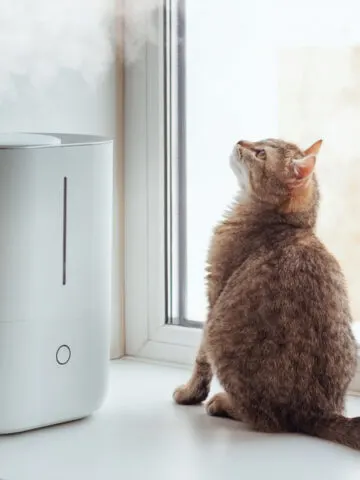When winter approaches, the air gets drier and cold, and flu season ramps up big time.
People start buying more cold medicine, hydration drinks, and humidifiers to help combat dry air and stuffy noses. But can humidifiers help cats like they can help humans?
Humidifiers can be beneficial for cats in some cases, like for cats with asthma, because they moisten the air.
Dry air tends to make asthma worse, giving your cats incredibly uncomfortable, stuffy noses.
However, it’s vital to use humidifiers appropriately with pets, as they can become hazardous to your cat in certain scenarios.
Before deciding to use a humidifier with your cat, it’s essential to know the benefits and potential risks. Plus, you need to determine if your cat really needs a humidifier, as in many cases, it isn’t necessary.
What Is A Humidifier?
With 8 million units installed every year, humidifiers have become a staple of the American household.
Despite their rising popularity, you may have yet to get acquainted with this appliance that could cleanse your cat’s nasal passages.
Humidifiers inject the air with moisture that alters the temperature and humidity of a room. Although most units utilize water, each runs off of electricity – a dangerous combination.
Be sure to keep any of these machines out of the reach of children and pets alike.
Each humidifier comes with a reservoir that stores water and releases it into a basin upon activation. A fan blows the water through a wicking filter and dispenses it as either warm or cool mist.
Best of all, these machines regulate your home’s temperature, dialing back or amping up whenever necessary to maintain the climate.
What Do Humidifiers Do?
While we now understand what humidifiers generally do, we have yet to determine why their inventors created them.
Shifting a room’s temperature and humidity is how humidifiers reach their ultimate goal: rejuvenating your body.
You’re not the only one that benefits from this – your pet appreciates their presence all the more.
Those regulated temperatures keep your cats warm in the wintertime and cool in the summer months. Our pets can’t shed clothing to keep off the heat or put on additional layers to ward off the chill.
Humidifiers consistently ensure that the entire household stays content in whatever weather comes your way.
Humidifiers do more than maintain the climate – they refresh your skin. Adding moisture into the air prevents skin from growing dry and itchy.
An important but understated purpose of humidifiers comes from their ability to fight off diseases.
Increased temperatures fight off airborne bacteria and viruses that could otherwise infect cats and their owners.
Do Cats Need Humidifiers?
At first glance, humidifiers can look like an unnecessary luxury unless there’s an illness on the loose. However, these machines can offer a lot more than their specialized skincare.
According to Cornell University, at least 1% of all cats in America suffer from acute or chronic asthma.
During wintertime, when the drier air increases the chance of asthma attacks, these machines could save your cat’s life.
Even if asthma itself doesn’t affect their daily lives, cats regularly rely on their sense of smell to survive. Any cat with asthma can suffer from clogged nasal passages day after day.
If they cannot detect a scent from their food, cats would sooner starve.
Cats have no means of reducing their own congestion or fending off asthma attacks. With 800,000 of our pets unable to help themselves, that responsibility falls to their owners.
Do Humidifiers Help Cats With Asthma?
While few could dispute the positive impact a humidifier could make, it’s always best to confirm our suspicions with science.
The American Society for Prevention of Animal Cruelty (ASPCA) believes that because dry air exacerbates asthma, humidifiers make a difference.
Asthma intensifies whenever its victim is in the vicinity of pollen, mold, or cigarette smoke.
Utilizing a humidifier can disperse smoke molecules, and its temperature regulation prevents mold growth in damp environments.
The air alone doesn’t trigger asthma. Stress plays an integral role in determining whether your cat’s body can fend off an impending attack or not.
Keeping our pets calm and content can prevent unexpected attacks.
Symptoms of Cat Asthma
How do you know if your cat has asthma? For those unfamiliar with the illness, there are numerous symptoms to keep an eye out for.
Minor symptoms include wheezing, weakness, lethargy, persistent coughing, or an abundance of mucus. While not life-threatening, these still inhibit the quality of a cat’s everyday life.
The symptoms to stay alert for include blue lips and gums or rapid and difficult breathing from an opened mouth.
If your cat suffers from any of these, seek immediate medical attention and keep your humidifier on at all times.
Which Humidifiers Are Safe for Cats?
Before purchasing a humidifier, it’s best to know your options, as some work better with pets than others. However, first, make sure you don’t already have a humidifier in your home’s HVAC system.
Some HVAC systems feature pre-installed humidifiers, so it might just be a matter of educating yourself as to how it works.
If you are unsure, consult your HVAC manual or speak with the installer or manufacturer of your unit.
But, if there’s no existing humidifier in your HVAC unit, then you can press on with purchasing a portable humidifier.
There are two main types of humidifiers that you can consider beyond cool-mist humidifiers: evaporative and ultrasonic.
How Evaporative Humidifiers Help Cats
Evaporative humidifiers are the most common type of humidifier available to the general public. These humidifiers utilize a fan to distribute humidity throughout their surrounding area.
Depending on the temperature you want to create, evaporative models come in two different variations: warm and cool mist humidifiers.
Inhabitants of colder climates could more readily assume a warm mist humidifier could serve their needs.
Boiled water inside of these models destroys the germs surrounding them, making them a near necessity during flu season.
Drawbacks of Evaporative Humidifiers For Cats
However, that boiled water also proves to be an evaporative humidifier’s downfall. No one could describe these humidifiers as sturdy.
A misplaced gesture, an adventurous child, or an unknowing pet could easily knock over the appliance.
If the machine tips over or opens up, the water inside could easily scald and scar anyone it touches. Cats, who do not know better, may even try to drink the water pouring out.
To prevent your pets from burns, keep humidifiers where no one but you can access them.
Because of this possibility, many pet owners opt for a cool-mist humidifier. Although cool mist versions won’t get rid of bacteria, they’re still helpful with eliminating dry air and easing conditions like asthma.
How Ultrasonic Humidifiers Help Cats
Evaporative humidifiers are not the only option on the market. As technology continued to advance, engineers invented a new variation of humidifiers: ultrasonic.
These machines vibrate at extremely high frequencies to generate droplets of moisture that they then dispense into the air.
Despite their shaking, ultrasonic humidifiers produce no noise. Or rather, they do not produce any noise that we can hear. The frequency of their sound waves can, however, affect our pet’s ears.
Before buying an ultrasonic model, be sure that you can test it out with your pet beforehand. Return home immediately, turn the humidifier on, and watch how your pet reacts to it (if at all).
Should they show any signs of discomfort or even recognition of the noise, return the humidifier for a refund.
Extra Tips For Using Humidifiers With Cats
If you plan to use a humidifier with your cat, make sure to monitor your cat while the humidifier is in operation. At least do so the first few times until your cat is used to it.
After all, to your cat, a humidifier probably looks like some strange fishbowl, and they won’t be able to resist investigating.
Choose a humidifier that has a quiet operation and isn’t overly large. Your cat doesn’t need a large humidifier, and if your curious kitty knocks it over, it won’t cause injury.
Look for humidifiers that are sturdy and not prone to toppling over easily.
Related Questions
Can I put essential oils in the humidifier to use with my cat?
Essential oils have grown in popularity over the years, helping humans do everything from sleep to breathing easier. But, this doesn’t mean they’re safe for pets.
Prolonged exposure to oils can harm your cat. Ingesting them can be fatal, and inhaling them over time can cause serious complications.
This goes doubly so if incorporating oils like Vicks VapoSteam into a warm mist humidifier.
The nutmeg oils inside already pose a threat to cats when inhaled – but ingesting them amps up the risk. Therefore, don’t put anything in your cat’s humidifier but water.
What kind of water do I put in my cat’s humidifier?
You use the same water in your cat’s humidifier as you do your own–distilled water. The reasoning is, if you use tap water, the humidifier can potentially release the minerals in the water into the air.
These minerals could cause health issues if inhaled.
Therefore, use distilled water so you won’t have any unwanted elements going into your lungs. Plus, using tap water in your humidifier can leave mineral deposits on the interior.
This becomes a breeding ground for bacteria.
Stacy is a lifelong animal lover who truly believes life just isn’t complete without pets. She’s had pets her whole life (including three dogs and a cat living under the same roof, somewhat harmoniously). She currently resides in NOLA with her husband, son, and two pups, Scooby “Dooby” Doo and Zoey. Stacy always makes a point to learn everything she can about her fur babies, and she has been writing about the pet-parent life for over two years.



Leave a comment
You must be logged in to post a comment.